Impact of Inflation on the UK Tourism Industry: A Research Report
VerifiedAdded on 2023/06/05
|10
|2635
|332
Report
AI Summary
This report examines the impact of inflation on the UK tourism industry, focusing on a small-sized tourism company called Explore. The report begins by defining inflation and its causes, such as demand-pull and cost-push inflation, and how it affects the tourism sector. It utilizes the Consumer Price Index (CPI) to illustrate inflation rates in the UK. The main body explores both positive and negative impacts of inflation, including higher profits and investment returns versus supply chain shortages and rising costs for businesses. The report concludes that while inflation can present challenges, particularly for small and medium-sized enterprises (SMEs), understanding its effects and implementing appropriate strategies is crucial for navigating the economic landscape. It also emphasizes the role of government regulations in supporting the tourism industry and mitigating negative impacts.
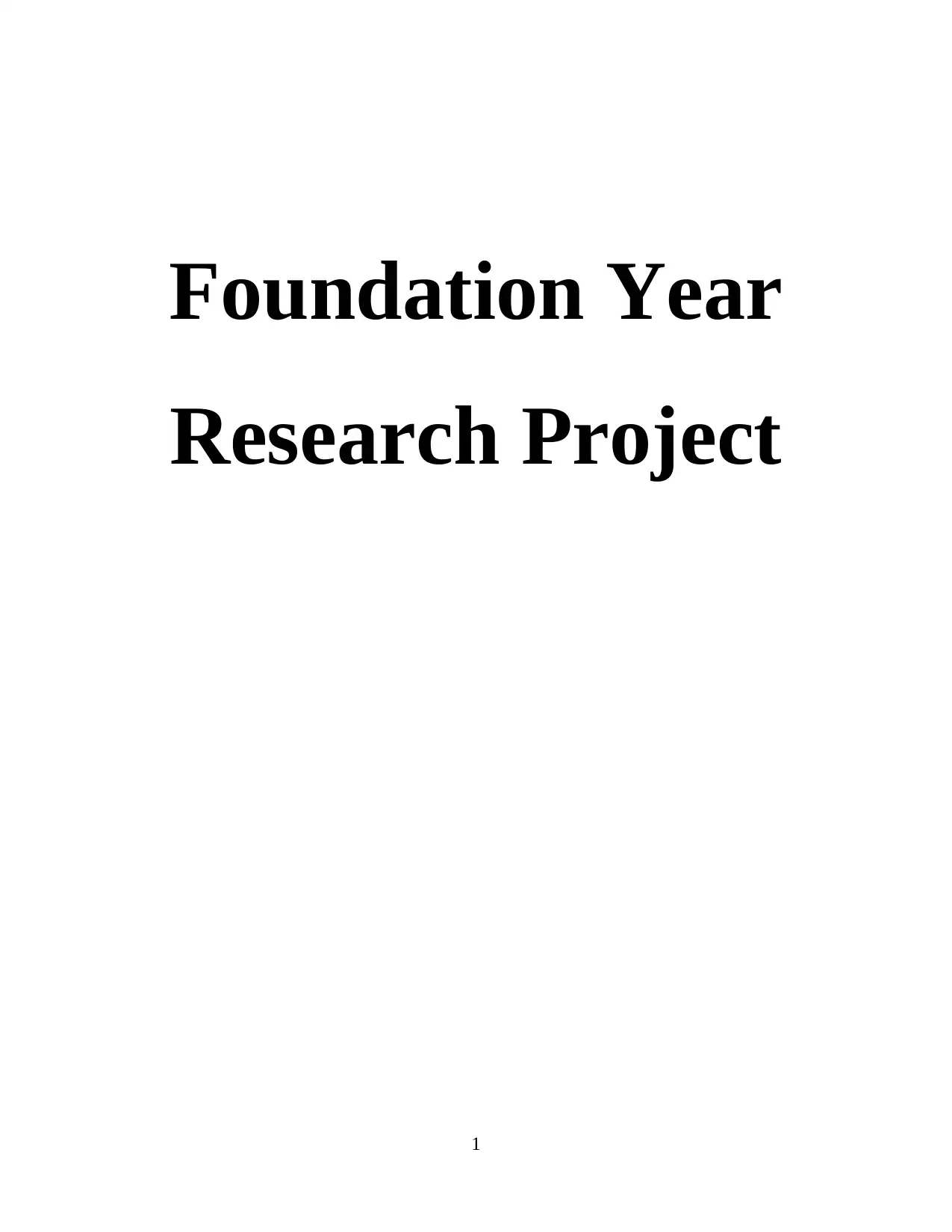
Foundation Year
Research Project
1
Research Project
1
Paraphrase This Document
Need a fresh take? Get an instant paraphrase of this document with our AI Paraphraser
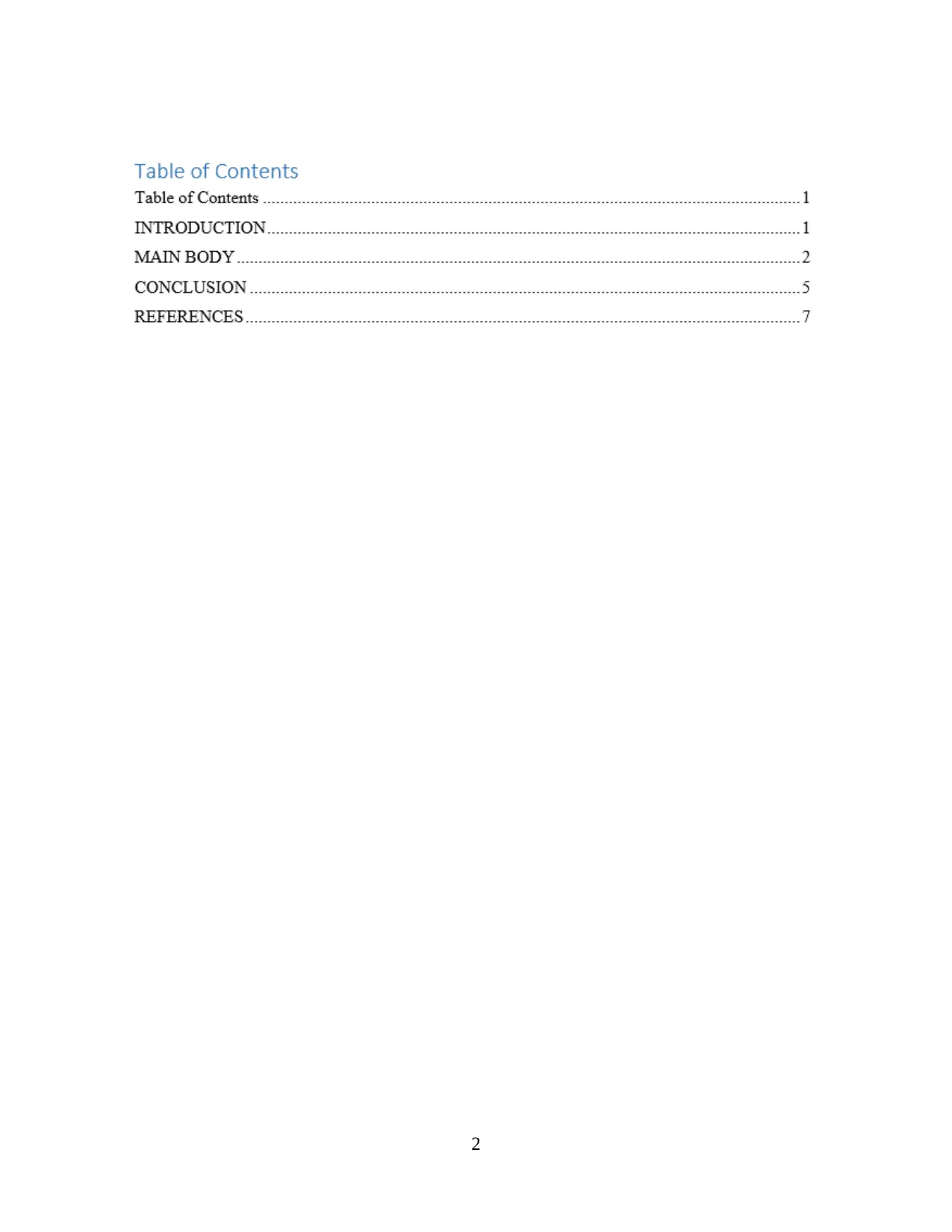
2
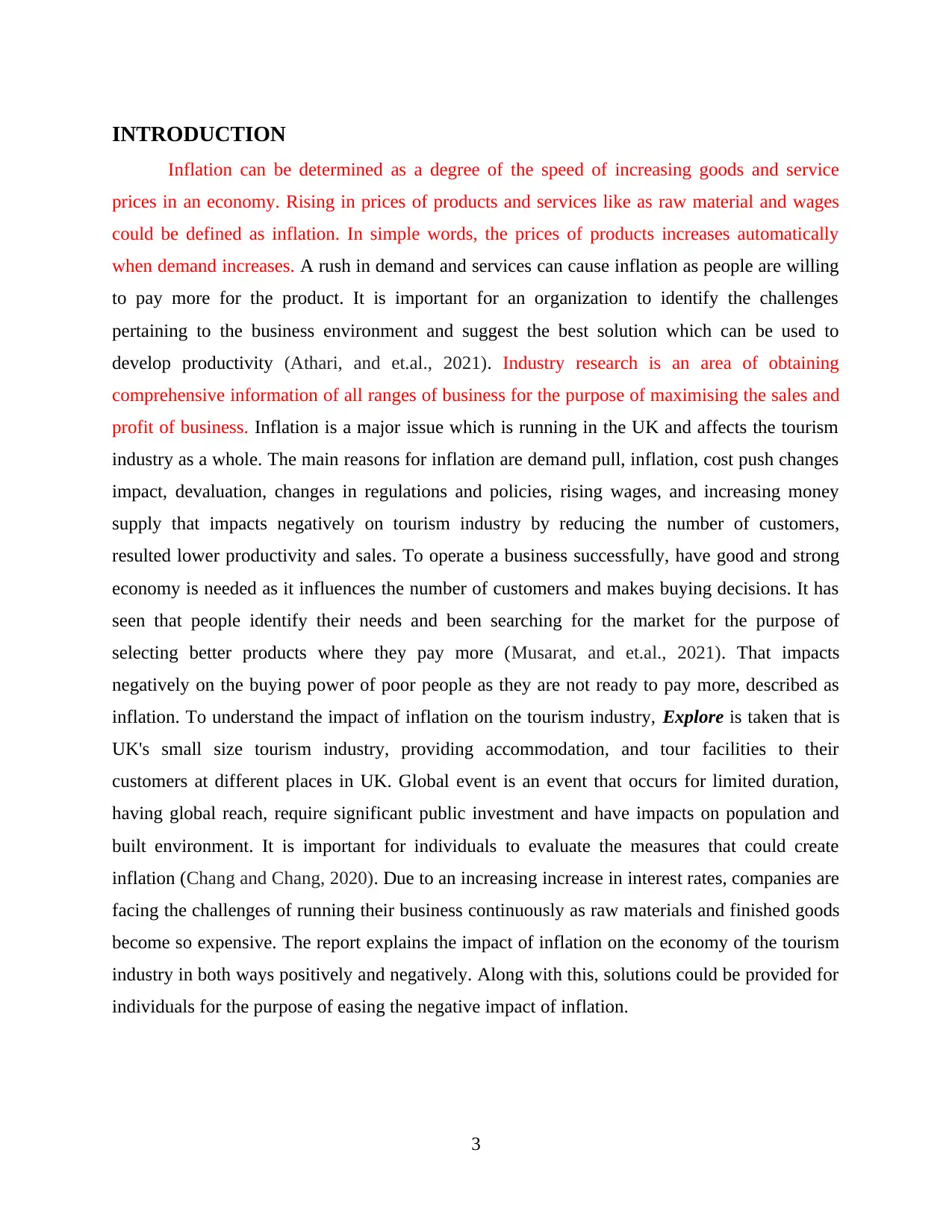
INTRODUCTION
Inflation can be determined as a degree of the speed of increasing goods and service
prices in an economy. Rising in prices of products and services like as raw material and wages
could be defined as inflation. In simple words, the prices of products increases automatically
when demand increases. A rush in demand and services can cause inflation as people are willing
to pay more for the product. It is important for an organization to identify the challenges
pertaining to the business environment and suggest the best solution which can be used to
develop productivity (Athari, and et.al., 2021). Industry research is an area of obtaining
comprehensive information of all ranges of business for the purpose of maximising the sales and
profit of business. Inflation is a major issue which is running in the UK and affects the tourism
industry as a whole. The main reasons for inflation are demand pull, inflation, cost push changes
impact, devaluation, changes in regulations and policies, rising wages, and increasing money
supply that impacts negatively on tourism industry by reducing the number of customers,
resulted lower productivity and sales. To operate a business successfully, have good and strong
economy is needed as it influences the number of customers and makes buying decisions. It has
seen that people identify their needs and been searching for the market for the purpose of
selecting better products where they pay more (Musarat, and et.al., 2021). That impacts
negatively on the buying power of poor people as they are not ready to pay more, described as
inflation. To understand the impact of inflation on the tourism industry, Explore is taken that is
UK's small size tourism industry, providing accommodation, and tour facilities to their
customers at different places in UK. Global event is an event that occurs for limited duration,
having global reach, require significant public investment and have impacts on population and
built environment. It is important for individuals to evaluate the measures that could create
inflation (Chang and Chang, 2020). Due to an increasing increase in interest rates, companies are
facing the challenges of running their business continuously as raw materials and finished goods
become so expensive. The report explains the impact of inflation on the economy of the tourism
industry in both ways positively and negatively. Along with this, solutions could be provided for
individuals for the purpose of easing the negative impact of inflation.
3
Inflation can be determined as a degree of the speed of increasing goods and service
prices in an economy. Rising in prices of products and services like as raw material and wages
could be defined as inflation. In simple words, the prices of products increases automatically
when demand increases. A rush in demand and services can cause inflation as people are willing
to pay more for the product. It is important for an organization to identify the challenges
pertaining to the business environment and suggest the best solution which can be used to
develop productivity (Athari, and et.al., 2021). Industry research is an area of obtaining
comprehensive information of all ranges of business for the purpose of maximising the sales and
profit of business. Inflation is a major issue which is running in the UK and affects the tourism
industry as a whole. The main reasons for inflation are demand pull, inflation, cost push changes
impact, devaluation, changes in regulations and policies, rising wages, and increasing money
supply that impacts negatively on tourism industry by reducing the number of customers,
resulted lower productivity and sales. To operate a business successfully, have good and strong
economy is needed as it influences the number of customers and makes buying decisions. It has
seen that people identify their needs and been searching for the market for the purpose of
selecting better products where they pay more (Musarat, and et.al., 2021). That impacts
negatively on the buying power of poor people as they are not ready to pay more, described as
inflation. To understand the impact of inflation on the tourism industry, Explore is taken that is
UK's small size tourism industry, providing accommodation, and tour facilities to their
customers at different places in UK. Global event is an event that occurs for limited duration,
having global reach, require significant public investment and have impacts on population and
built environment. It is important for individuals to evaluate the measures that could create
inflation (Chang and Chang, 2020). Due to an increasing increase in interest rates, companies are
facing the challenges of running their business continuously as raw materials and finished goods
become so expensive. The report explains the impact of inflation on the economy of the tourism
industry in both ways positively and negatively. Along with this, solutions could be provided for
individuals for the purpose of easing the negative impact of inflation.
3
⊘ This is a preview!⊘
Do you want full access?
Subscribe today to unlock all pages.

Trusted by 1+ million students worldwide
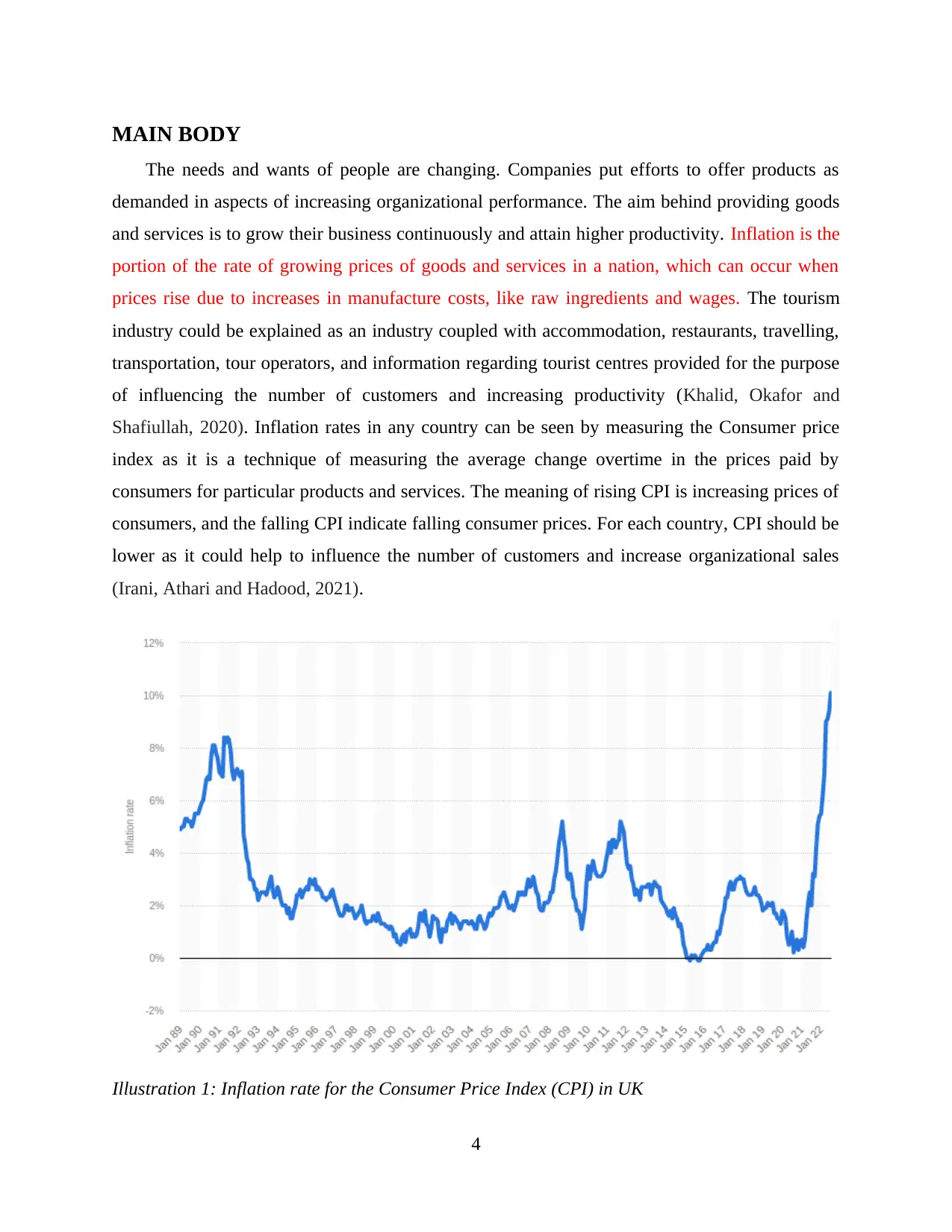
MAIN BODY
The needs and wants of people are changing. Companies put efforts to offer products as
demanded in aspects of increasing organizational performance. The aim behind providing goods
and services is to grow their business continuously and attain higher productivity. Inflation is the
portion of the rate of growing prices of goods and services in a nation, which can occur when
prices rise due to increases in manufacture costs, like raw ingredients and wages. The tourism
industry could be explained as an industry coupled with accommodation, restaurants, travelling,
transportation, tour operators, and information regarding tourist centres provided for the purpose
of influencing the number of customers and increasing productivity (Khalid, Okafor and
Shafiullah, 2020). Inflation rates in any country can be seen by measuring the Consumer price
index as it is a technique of measuring the average change overtime in the prices paid by
consumers for particular products and services. The meaning of rising CPI is increasing prices of
consumers, and the falling CPI indicate falling consumer prices. For each country, CPI should be
lower as it could help to influence the number of customers and increase organizational sales
(Irani, Athari and Hadood, 2021).
Illustration 1: Inflation rate for the Consumer Price Index (CPI) in UK
4
The needs and wants of people are changing. Companies put efforts to offer products as
demanded in aspects of increasing organizational performance. The aim behind providing goods
and services is to grow their business continuously and attain higher productivity. Inflation is the
portion of the rate of growing prices of goods and services in a nation, which can occur when
prices rise due to increases in manufacture costs, like raw ingredients and wages. The tourism
industry could be explained as an industry coupled with accommodation, restaurants, travelling,
transportation, tour operators, and information regarding tourist centres provided for the purpose
of influencing the number of customers and increasing productivity (Khalid, Okafor and
Shafiullah, 2020). Inflation rates in any country can be seen by measuring the Consumer price
index as it is a technique of measuring the average change overtime in the prices paid by
consumers for particular products and services. The meaning of rising CPI is increasing prices of
consumers, and the falling CPI indicate falling consumer prices. For each country, CPI should be
lower as it could help to influence the number of customers and increase organizational sales
(Irani, Athari and Hadood, 2021).
Illustration 1: Inflation rate for the Consumer Price Index (CPI) in UK
4
Paraphrase This Document
Need a fresh take? Get an instant paraphrase of this document with our AI Paraphraser
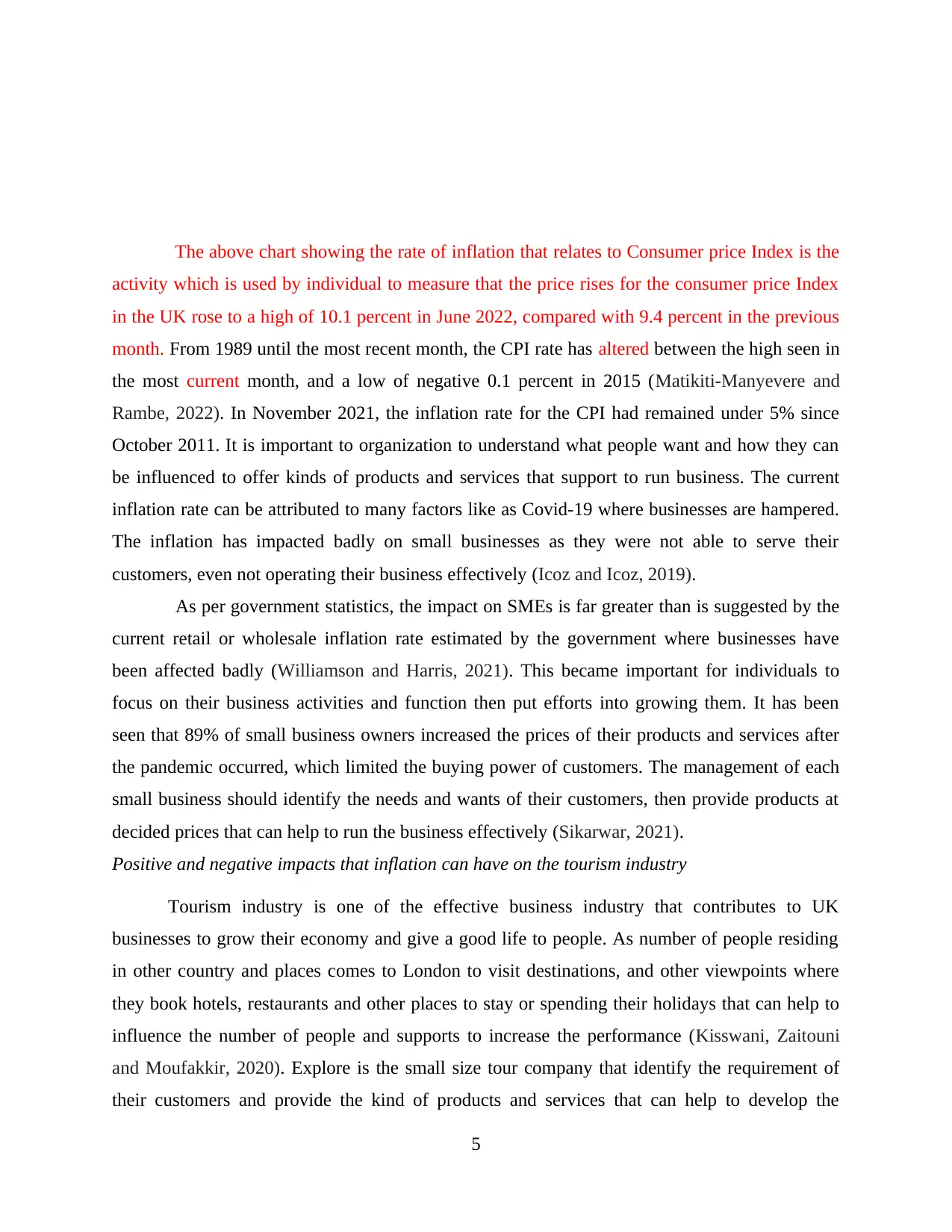
The above chart showing the rate of inflation that relates to Consumer price Index is the
activity which is used by individual to measure that the price rises for the consumer price Index
in the UK rose to a high of 10.1 percent in June 2022, compared with 9.4 percent in the previous
month. From 1989 until the most recent month, the CPI rate has altered between the high seen in
the most current month, and a low of negative 0.1 percent in 2015 (Matikiti-Manyevere and
Rambe, 2022). In November 2021, the inflation rate for the CPI had remained under 5% since
October 2011. It is important to organization to understand what people want and how they can
be influenced to offer kinds of products and services that support to run business. The current
inflation rate can be attributed to many factors like as Covid-19 where businesses are hampered.
The inflation has impacted badly on small businesses as they were not able to serve their
customers, even not operating their business effectively (Icoz and Icoz, 2019).
As per government statistics, the impact on SMEs is far greater than is suggested by the
current retail or wholesale inflation rate estimated by the government where businesses have
been affected badly (Williamson and Harris, 2021). This became important for individuals to
focus on their business activities and function then put efforts into growing them. It has been
seen that 89% of small business owners increased the prices of their products and services after
the pandemic occurred, which limited the buying power of customers. The management of each
small business should identify the needs and wants of their customers, then provide products at
decided prices that can help to run the business effectively (Sikarwar, 2021).
Positive and negative impacts that inflation can have on the tourism industry
Tourism industry is one of the effective business industry that contributes to UK
businesses to grow their economy and give a good life to people. As number of people residing
in other country and places comes to London to visit destinations, and other viewpoints where
they book hotels, restaurants and other places to stay or spending their holidays that can help to
influence the number of people and supports to increase the performance (Kisswani, Zaitouni
and Moufakkir, 2020). Explore is the small size tour company that identify the requirement of
their customers and provide the kind of products and services that can help to develop the
5
activity which is used by individual to measure that the price rises for the consumer price Index
in the UK rose to a high of 10.1 percent in June 2022, compared with 9.4 percent in the previous
month. From 1989 until the most recent month, the CPI rate has altered between the high seen in
the most current month, and a low of negative 0.1 percent in 2015 (Matikiti-Manyevere and
Rambe, 2022). In November 2021, the inflation rate for the CPI had remained under 5% since
October 2011. It is important to organization to understand what people want and how they can
be influenced to offer kinds of products and services that support to run business. The current
inflation rate can be attributed to many factors like as Covid-19 where businesses are hampered.
The inflation has impacted badly on small businesses as they were not able to serve their
customers, even not operating their business effectively (Icoz and Icoz, 2019).
As per government statistics, the impact on SMEs is far greater than is suggested by the
current retail or wholesale inflation rate estimated by the government where businesses have
been affected badly (Williamson and Harris, 2021). This became important for individuals to
focus on their business activities and function then put efforts into growing them. It has been
seen that 89% of small business owners increased the prices of their products and services after
the pandemic occurred, which limited the buying power of customers. The management of each
small business should identify the needs and wants of their customers, then provide products at
decided prices that can help to run the business effectively (Sikarwar, 2021).
Positive and negative impacts that inflation can have on the tourism industry
Tourism industry is one of the effective business industry that contributes to UK
businesses to grow their economy and give a good life to people. As number of people residing
in other country and places comes to London to visit destinations, and other viewpoints where
they book hotels, restaurants and other places to stay or spending their holidays that can help to
influence the number of people and supports to increase the performance (Kisswani, Zaitouni
and Moufakkir, 2020). Explore is the small size tour company that identify the requirement of
their customers and provide the kind of products and services that can help to develop the
5
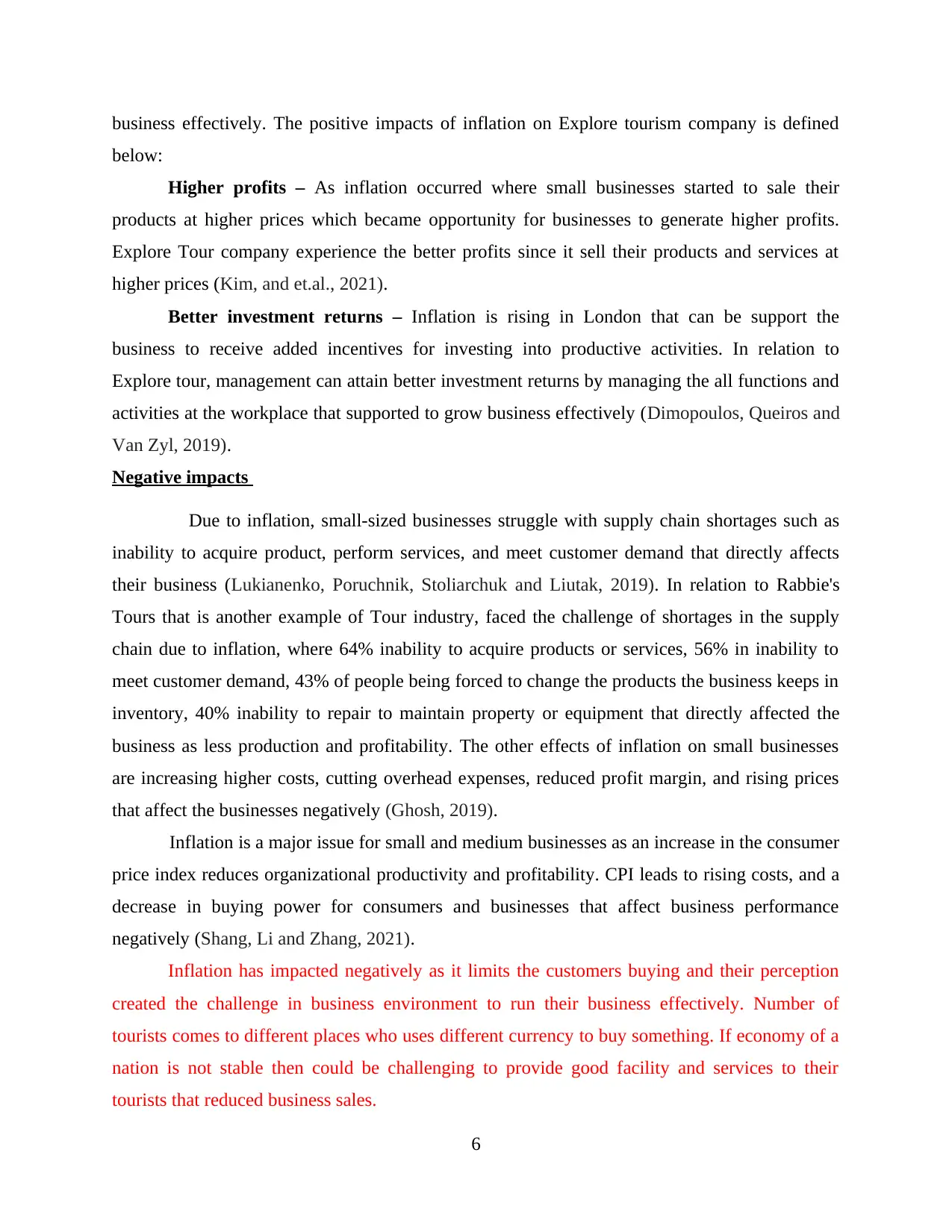
business effectively. The positive impacts of inflation on Explore tourism company is defined
below:
Higher profits – As inflation occurred where small businesses started to sale their
products at higher prices which became opportunity for businesses to generate higher profits.
Explore Tour company experience the better profits since it sell their products and services at
higher prices (Kim, and et.al., 2021).
Better investment returns – Inflation is rising in London that can be support the
business to receive added incentives for investing into productive activities. In relation to
Explore tour, management can attain better investment returns by managing the all functions and
activities at the workplace that supported to grow business effectively (Dimopoulos, Queiros and
Van Zyl, 2019).
Negative impacts
Due to inflation, small-sized businesses struggle with supply chain shortages such as
inability to acquire product, perform services, and meet customer demand that directly affects
their business (Lukianenko, Poruchnik, Stoliarchuk and Liutak, 2019). In relation to Rabbie's
Tours that is another example of Tour industry, faced the challenge of shortages in the supply
chain due to inflation, where 64% inability to acquire products or services, 56% in inability to
meet customer demand, 43% of people being forced to change the products the business keeps in
inventory, 40% inability to repair to maintain property or equipment that directly affected the
business as less production and profitability. The other effects of inflation on small businesses
are increasing higher costs, cutting overhead expenses, reduced profit margin, and rising prices
that affect the businesses negatively (Ghosh, 2019).
Inflation is a major issue for small and medium businesses as an increase in the consumer
price index reduces organizational productivity and profitability. CPI leads to rising costs, and a
decrease in buying power for consumers and businesses that affect business performance
negatively (Shang, Li and Zhang, 2021).
Inflation has impacted negatively as it limits the customers buying and their perception
created the challenge in business environment to run their business effectively. Number of
tourists comes to different places who uses different currency to buy something. If economy of a
nation is not stable then could be challenging to provide good facility and services to their
tourists that reduced business sales.
6
below:
Higher profits – As inflation occurred where small businesses started to sale their
products at higher prices which became opportunity for businesses to generate higher profits.
Explore Tour company experience the better profits since it sell their products and services at
higher prices (Kim, and et.al., 2021).
Better investment returns – Inflation is rising in London that can be support the
business to receive added incentives for investing into productive activities. In relation to
Explore tour, management can attain better investment returns by managing the all functions and
activities at the workplace that supported to grow business effectively (Dimopoulos, Queiros and
Van Zyl, 2019).
Negative impacts
Due to inflation, small-sized businesses struggle with supply chain shortages such as
inability to acquire product, perform services, and meet customer demand that directly affects
their business (Lukianenko, Poruchnik, Stoliarchuk and Liutak, 2019). In relation to Rabbie's
Tours that is another example of Tour industry, faced the challenge of shortages in the supply
chain due to inflation, where 64% inability to acquire products or services, 56% in inability to
meet customer demand, 43% of people being forced to change the products the business keeps in
inventory, 40% inability to repair to maintain property or equipment that directly affected the
business as less production and profitability. The other effects of inflation on small businesses
are increasing higher costs, cutting overhead expenses, reduced profit margin, and rising prices
that affect the businesses negatively (Ghosh, 2019).
Inflation is a major issue for small and medium businesses as an increase in the consumer
price index reduces organizational productivity and profitability. CPI leads to rising costs, and a
decrease in buying power for consumers and businesses that affect business performance
negatively (Shang, Li and Zhang, 2021).
Inflation has impacted negatively as it limits the customers buying and their perception
created the challenge in business environment to run their business effectively. Number of
tourists comes to different places who uses different currency to buy something. If economy of a
nation is not stable then could be challenging to provide good facility and services to their
tourists that reduced business sales.
6
⊘ This is a preview!⊘
Do you want full access?
Subscribe today to unlock all pages.

Trusted by 1+ million students worldwide
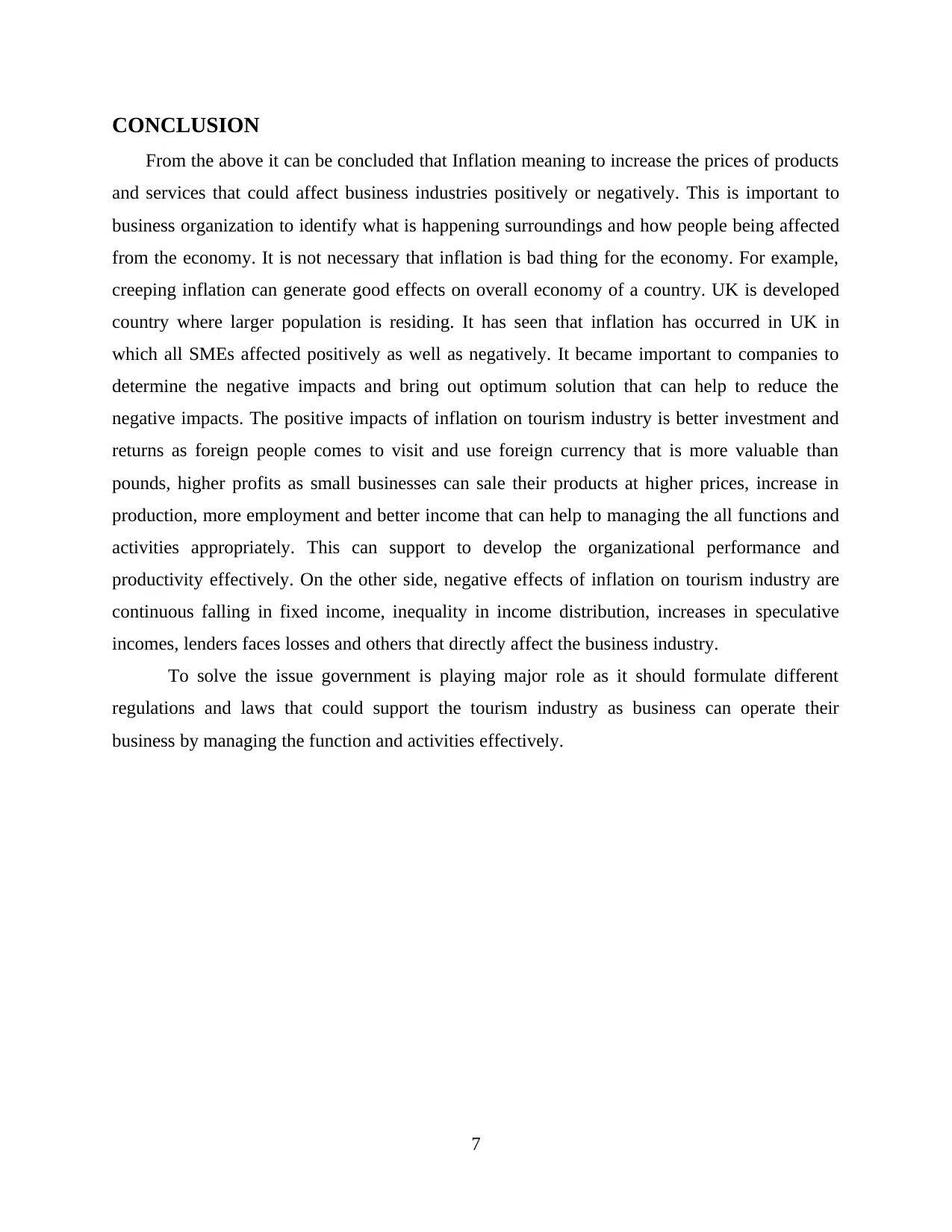
CONCLUSION
From the above it can be concluded that Inflation meaning to increase the prices of products
and services that could affect business industries positively or negatively. This is important to
business organization to identify what is happening surroundings and how people being affected
from the economy. It is not necessary that inflation is bad thing for the economy. For example,
creeping inflation can generate good effects on overall economy of a country. UK is developed
country where larger population is residing. It has seen that inflation has occurred in UK in
which all SMEs affected positively as well as negatively. It became important to companies to
determine the negative impacts and bring out optimum solution that can help to reduce the
negative impacts. The positive impacts of inflation on tourism industry is better investment and
returns as foreign people comes to visit and use foreign currency that is more valuable than
pounds, higher profits as small businesses can sale their products at higher prices, increase in
production, more employment and better income that can help to managing the all functions and
activities appropriately. This can support to develop the organizational performance and
productivity effectively. On the other side, negative effects of inflation on tourism industry are
continuous falling in fixed income, inequality in income distribution, increases in speculative
incomes, lenders faces losses and others that directly affect the business industry.
To solve the issue government is playing major role as it should formulate different
regulations and laws that could support the tourism industry as business can operate their
business by managing the function and activities effectively.
7
From the above it can be concluded that Inflation meaning to increase the prices of products
and services that could affect business industries positively or negatively. This is important to
business organization to identify what is happening surroundings and how people being affected
from the economy. It is not necessary that inflation is bad thing for the economy. For example,
creeping inflation can generate good effects on overall economy of a country. UK is developed
country where larger population is residing. It has seen that inflation has occurred in UK in
which all SMEs affected positively as well as negatively. It became important to companies to
determine the negative impacts and bring out optimum solution that can help to reduce the
negative impacts. The positive impacts of inflation on tourism industry is better investment and
returns as foreign people comes to visit and use foreign currency that is more valuable than
pounds, higher profits as small businesses can sale their products at higher prices, increase in
production, more employment and better income that can help to managing the all functions and
activities appropriately. This can support to develop the organizational performance and
productivity effectively. On the other side, negative effects of inflation on tourism industry are
continuous falling in fixed income, inequality in income distribution, increases in speculative
incomes, lenders faces losses and others that directly affect the business industry.
To solve the issue government is playing major role as it should formulate different
regulations and laws that could support the tourism industry as business can operate their
business by managing the function and activities effectively.
7
Paraphrase This Document
Need a fresh take? Get an instant paraphrase of this document with our AI Paraphraser

8
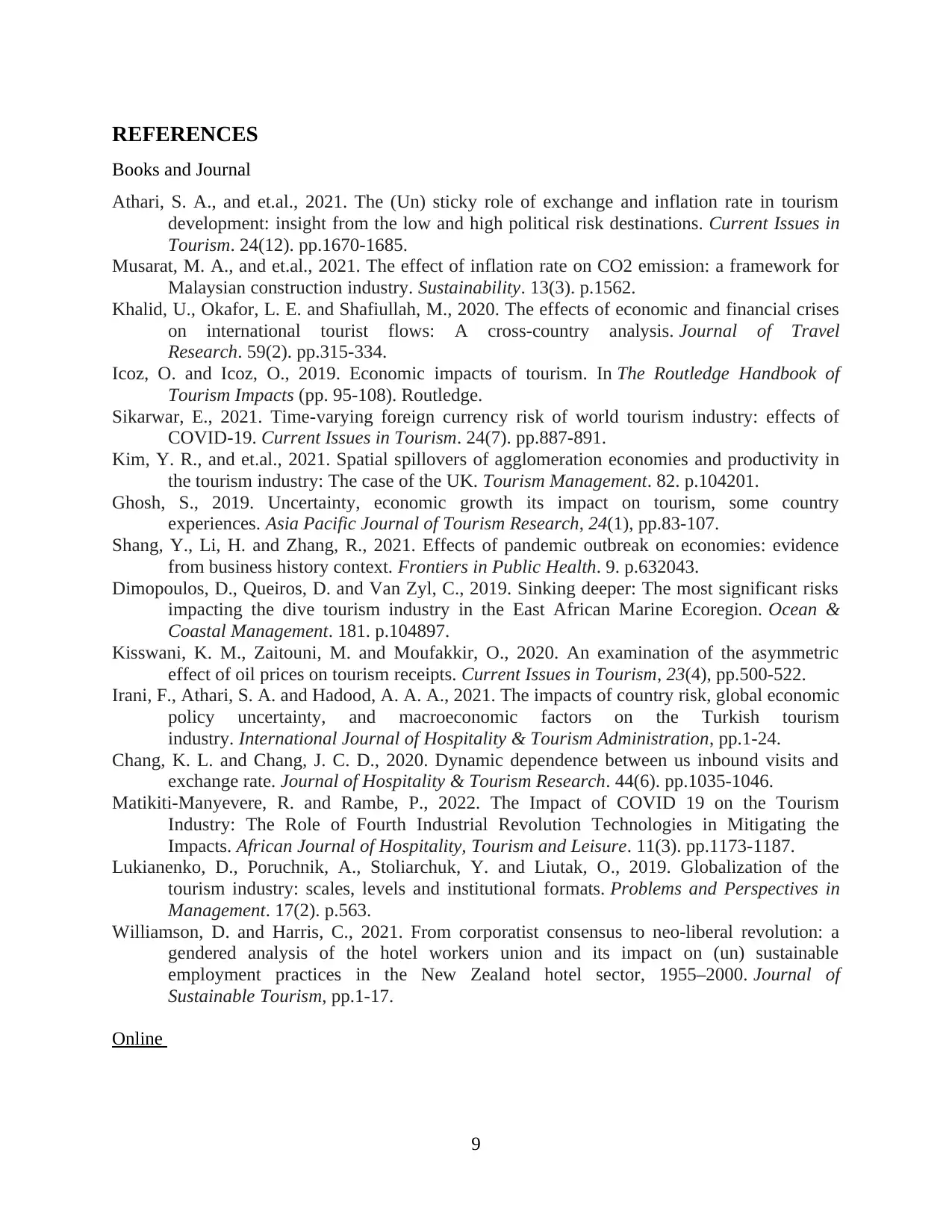
REFERENCES
Books and Journal
Athari, S. A., and et.al., 2021. The (Un) sticky role of exchange and inflation rate in tourism
development: insight from the low and high political risk destinations. Current Issues in
Tourism. 24(12). pp.1670-1685.
Musarat, M. A., and et.al., 2021. The effect of inflation rate on CO2 emission: a framework for
Malaysian construction industry. Sustainability. 13(3). p.1562.
Khalid, U., Okafor, L. E. and Shafiullah, M., 2020. The effects of economic and financial crises
on international tourist flows: A cross-country analysis. Journal of Travel
Research. 59(2). pp.315-334.
Icoz, O. and Icoz, O., 2019. Economic impacts of tourism. In The Routledge Handbook of
Tourism Impacts (pp. 95-108). Routledge.
Sikarwar, E., 2021. Time-varying foreign currency risk of world tourism industry: effects of
COVID-19. Current Issues in Tourism. 24(7). pp.887-891.
Kim, Y. R., and et.al., 2021. Spatial spillovers of agglomeration economies and productivity in
the tourism industry: The case of the UK. Tourism Management. 82. p.104201.
Ghosh, S., 2019. Uncertainty, economic growth its impact on tourism, some country
experiences. Asia Pacific Journal of Tourism Research, 24(1), pp.83-107.
Shang, Y., Li, H. and Zhang, R., 2021. Effects of pandemic outbreak on economies: evidence
from business history context. Frontiers in Public Health. 9. p.632043.
Dimopoulos, D., Queiros, D. and Van Zyl, C., 2019. Sinking deeper: The most significant risks
impacting the dive tourism industry in the East African Marine Ecoregion. Ocean &
Coastal Management. 181. p.104897.
Kisswani, K. M., Zaitouni, M. and Moufakkir, O., 2020. An examination of the asymmetric
effect of oil prices on tourism receipts. Current Issues in Tourism, 23(4), pp.500-522.
Irani, F., Athari, S. A. and Hadood, A. A. A., 2021. The impacts of country risk, global economic
policy uncertainty, and macroeconomic factors on the Turkish tourism
industry. International Journal of Hospitality & Tourism Administration, pp.1-24.
Chang, K. L. and Chang, J. C. D., 2020. Dynamic dependence between us inbound visits and
exchange rate. Journal of Hospitality & Tourism Research. 44(6). pp.1035-1046.
Matikiti-Manyevere, R. and Rambe, P., 2022. The Impact of COVID 19 on the Tourism
Industry: The Role of Fourth Industrial Revolution Technologies in Mitigating the
Impacts. African Journal of Hospitality, Tourism and Leisure. 11(3). pp.1173-1187.
Lukianenko, D., Poruchnik, A., Stoliarchuk, Y. and Liutak, O., 2019. Globalization of the
tourism industry: scales, levels and institutional formats. Problems and Perspectives in
Management. 17(2). p.563.
Williamson, D. and Harris, C., 2021. From corporatist consensus to neo-liberal revolution: a
gendered analysis of the hotel workers union and its impact on (un) sustainable
employment practices in the New Zealand hotel sector, 1955–2000. Journal of
Sustainable Tourism, pp.1-17.
Online
9
Books and Journal
Athari, S. A., and et.al., 2021. The (Un) sticky role of exchange and inflation rate in tourism
development: insight from the low and high political risk destinations. Current Issues in
Tourism. 24(12). pp.1670-1685.
Musarat, M. A., and et.al., 2021. The effect of inflation rate on CO2 emission: a framework for
Malaysian construction industry. Sustainability. 13(3). p.1562.
Khalid, U., Okafor, L. E. and Shafiullah, M., 2020. The effects of economic and financial crises
on international tourist flows: A cross-country analysis. Journal of Travel
Research. 59(2). pp.315-334.
Icoz, O. and Icoz, O., 2019. Economic impacts of tourism. In The Routledge Handbook of
Tourism Impacts (pp. 95-108). Routledge.
Sikarwar, E., 2021. Time-varying foreign currency risk of world tourism industry: effects of
COVID-19. Current Issues in Tourism. 24(7). pp.887-891.
Kim, Y. R., and et.al., 2021. Spatial spillovers of agglomeration economies and productivity in
the tourism industry: The case of the UK. Tourism Management. 82. p.104201.
Ghosh, S., 2019. Uncertainty, economic growth its impact on tourism, some country
experiences. Asia Pacific Journal of Tourism Research, 24(1), pp.83-107.
Shang, Y., Li, H. and Zhang, R., 2021. Effects of pandemic outbreak on economies: evidence
from business history context. Frontiers in Public Health. 9. p.632043.
Dimopoulos, D., Queiros, D. and Van Zyl, C., 2019. Sinking deeper: The most significant risks
impacting the dive tourism industry in the East African Marine Ecoregion. Ocean &
Coastal Management. 181. p.104897.
Kisswani, K. M., Zaitouni, M. and Moufakkir, O., 2020. An examination of the asymmetric
effect of oil prices on tourism receipts. Current Issues in Tourism, 23(4), pp.500-522.
Irani, F., Athari, S. A. and Hadood, A. A. A., 2021. The impacts of country risk, global economic
policy uncertainty, and macroeconomic factors on the Turkish tourism
industry. International Journal of Hospitality & Tourism Administration, pp.1-24.
Chang, K. L. and Chang, J. C. D., 2020. Dynamic dependence between us inbound visits and
exchange rate. Journal of Hospitality & Tourism Research. 44(6). pp.1035-1046.
Matikiti-Manyevere, R. and Rambe, P., 2022. The Impact of COVID 19 on the Tourism
Industry: The Role of Fourth Industrial Revolution Technologies in Mitigating the
Impacts. African Journal of Hospitality, Tourism and Leisure. 11(3). pp.1173-1187.
Lukianenko, D., Poruchnik, A., Stoliarchuk, Y. and Liutak, O., 2019. Globalization of the
tourism industry: scales, levels and institutional formats. Problems and Perspectives in
Management. 17(2). p.563.
Williamson, D. and Harris, C., 2021. From corporatist consensus to neo-liberal revolution: a
gendered analysis of the hotel workers union and its impact on (un) sustainable
employment practices in the New Zealand hotel sector, 1955–2000. Journal of
Sustainable Tourism, pp.1-17.
Online
9
⊘ This is a preview!⊘
Do you want full access?
Subscribe today to unlock all pages.

Trusted by 1+ million students worldwide
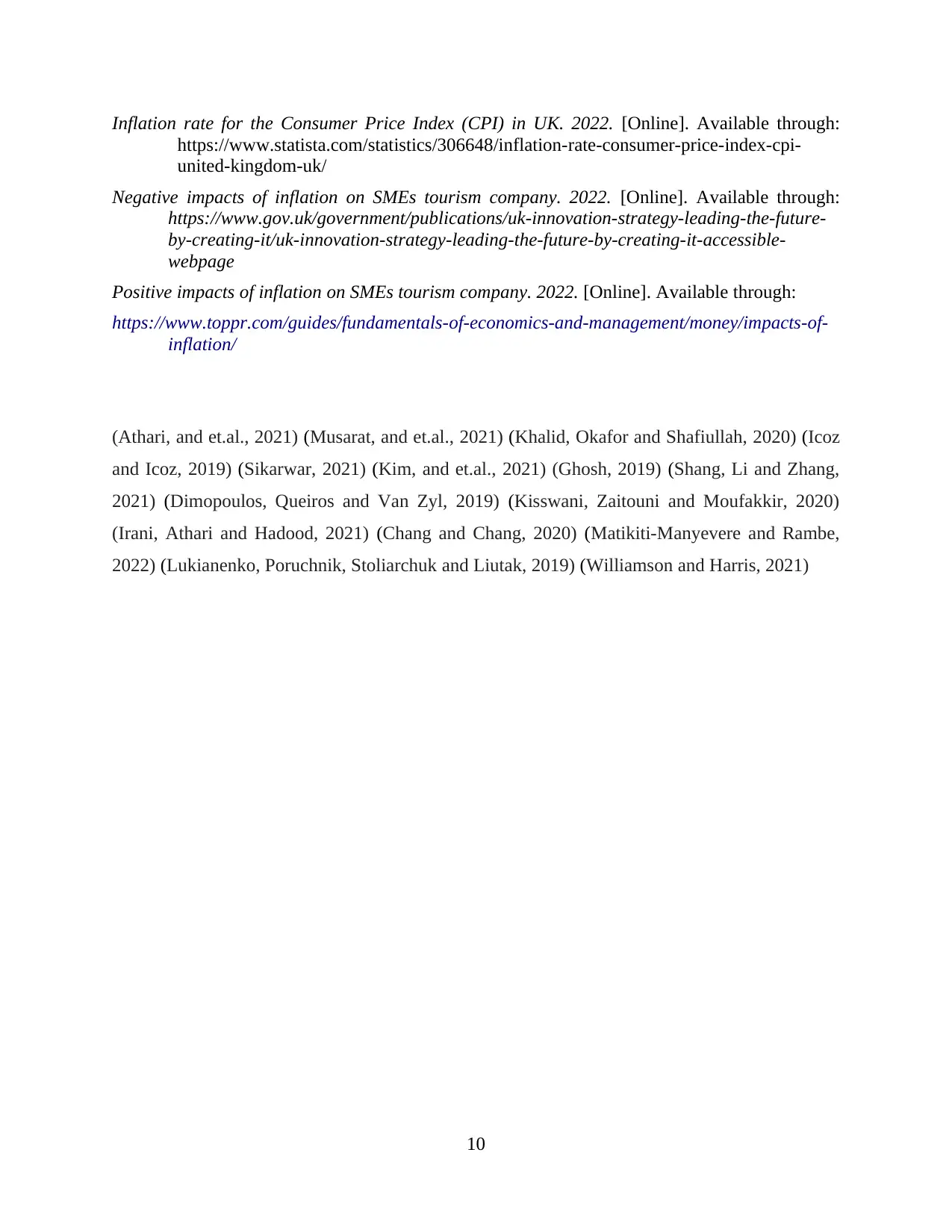
Inflation rate for the Consumer Price Index (CPI) in UK. 2022. [Online]. Available through:
https://www.statista.com/statistics/306648/inflation-rate-consumer-price-index-cpi-
united-kingdom-uk/
Negative impacts of inflation on SMEs tourism company. 2022. [Online]. Available through:
https://www.gov.uk/government/publications/uk-innovation-strategy-leading-the-future-
by-creating-it/uk-innovation-strategy-leading-the-future-by-creating-it-accessible-
webpage
Positive impacts of inflation on SMEs tourism company. 2022. [Online]. Available through:
https://www.toppr.com/guides/fundamentals-of-economics-and-management/money/impacts-of-
inflation/
(Athari, and et.al., 2021) (Musarat, and et.al., 2021) (Khalid, Okafor and Shafiullah, 2020) (Icoz
and Icoz, 2019) (Sikarwar, 2021) (Kim, and et.al., 2021) (Ghosh, 2019) (Shang, Li and Zhang,
2021) (Dimopoulos, Queiros and Van Zyl, 2019) (Kisswani, Zaitouni and Moufakkir, 2020)
(Irani, Athari and Hadood, 2021) (Chang and Chang, 2020) (Matikiti-Manyevere and Rambe,
2022) (Lukianenko, Poruchnik, Stoliarchuk and Liutak, 2019) (Williamson and Harris, 2021)
10
https://www.statista.com/statistics/306648/inflation-rate-consumer-price-index-cpi-
united-kingdom-uk/
Negative impacts of inflation on SMEs tourism company. 2022. [Online]. Available through:
https://www.gov.uk/government/publications/uk-innovation-strategy-leading-the-future-
by-creating-it/uk-innovation-strategy-leading-the-future-by-creating-it-accessible-
webpage
Positive impacts of inflation on SMEs tourism company. 2022. [Online]. Available through:
https://www.toppr.com/guides/fundamentals-of-economics-and-management/money/impacts-of-
inflation/
(Athari, and et.al., 2021) (Musarat, and et.al., 2021) (Khalid, Okafor and Shafiullah, 2020) (Icoz
and Icoz, 2019) (Sikarwar, 2021) (Kim, and et.al., 2021) (Ghosh, 2019) (Shang, Li and Zhang,
2021) (Dimopoulos, Queiros and Van Zyl, 2019) (Kisswani, Zaitouni and Moufakkir, 2020)
(Irani, Athari and Hadood, 2021) (Chang and Chang, 2020) (Matikiti-Manyevere and Rambe,
2022) (Lukianenko, Poruchnik, Stoliarchuk and Liutak, 2019) (Williamson and Harris, 2021)
10
1 out of 10
Related Documents
Your All-in-One AI-Powered Toolkit for Academic Success.
+13062052269
info@desklib.com
Available 24*7 on WhatsApp / Email
![[object Object]](/_next/static/media/star-bottom.7253800d.svg)
Unlock your academic potential
Copyright © 2020–2026 A2Z Services. All Rights Reserved. Developed and managed by ZUCOL.



